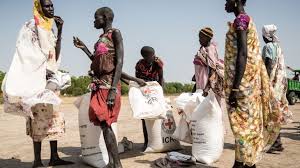In West and Central Africa, 15.4 million cases of acute malnutrition in children under five years of age (one third of whom are severe) are expected in 2020, if adequate measures are not put in place as of now, UN agencies alerted on Friday.
“This represents an increase of 20 percent compared to previous estimates of January 2020, according to an analysis of the impact of food insecurity combined with that of Covid-19 on acute malnutrition in 19 countries of the region,” the World Food Program (WFP) and the United Nations Children’s Fund (UNICEF) said in a joint statement.
According to these two UN agencies, conflict and armed violence have led to the displacement of massive populations and limited access to basic social services, which has increased cases of child malnutrition to unprecedented levels.
“The Coronavirus disease exacerbates the fragile contexts in West and Central Africa, especially in Burkina Faso, Mali, Mauritania, Niger, Senegal and Chad, which were already affected by food insecurity and malnutrition. According to forecasts before the coronavirus pandemic, 4.5 million cases of severe malnutrition were anticipated in 2020, in these 6 countries. Today, with increased insecurity and the Covid-19 crisis, that number has risen to almost 5.4 million cases,” the UN added.
As a consequence, Marie-Pierre Poirier, UNICEF Regional Director for West and Central Africa, said: “children suffering from severe acute malnutrition are more exposed to the complications linked to the Covid-19.” While good nutrition for children, from their very first days, protects against illnesses and infections, and promotes their recovery from falling ill.”
Several factors threaten the nutritional status of children under five in West and Central Africa. These include household food insecurity, poor nutrition and feeding practices for mothers and infants, conflict and armed violence, displacement, high rates of childhood illness and water-borne diseases such as diarrhea, the fragility of health systems, lack of access to clean water and sanitation, and chronic poverty.
“In addition to these determinants of malnutrition, measures to limit the spread of the Covid-19 pandemic have led to disruptions in the production and distribution of food, in health and humanitarian supply chains, as well as a slowdown in economic activities. The pandemic has had an indirect negative impact on food systems, household incomes and food security, as well as on the availability and access to malnutrition treatment services,” the WFP and UNICEF explain.
TE/fss/abj/APA


